- Clone
- OX-90 (See other available formats)
- Regulatory Status
- RUO
- Other Names
- OX-2, MRC
- Isotype
- Rat IgG2a, κ
- Ave. Rating
- Submit a Review
- Product Citations
- publications

-

C57BL/6 mouse splenocytes were stained with anti-mouse CD45R/B220 (clone RA3-6B2) FITC and anti-mouse CD200 (OX2) (clone OX-90) PE (left) or rat IgG2a, κ PE isotype control (right).
| Cat # | Size | Price | Quantity Check Availability | Save | ||
|---|---|---|---|---|---|---|
| 123807 | 50 µg | 92€ | ||||
| 123808 | 200 µg | 254€ | ||||
CD200 (OX-2 antigen) is a type-1 membrane glycoprotein containing two extracellular Ig-like domains. CD200 a highly conserved type I membrane glycoprotein that is expressed on a variety of cell types including thymocytes, some T cells, endothelial and follicular dendritc cells, B cells, and brain tissue (neurons); but not on NK cells, granulocytes, monocytes, or macrophages. CD200 costimulates T cell proliferation. It may regulate myeloid cell activity in a variety of tissues. CD200 is the ligand for CD200 receptor (CD200R). The CD200 Receptor is restricted to myeloid cells, and it is believed that its engagement with CD200 results in inhibition and/or downregulation of myeloid cell activity. Blocking of CD200/CD200R interactions decreases myeloid cell inhibitory thresholds which results in enhanced immune activation.
Product DetailsProduct Details
- Verified Reactivity
- mouse
- Antibody Type
- Monoclonal
- Host Species
- Rat
- Immunogen
- Soluble fusion protein of the extracellular region of mouse OX-2 antigen with domains 3 and 4 of rat CD4 fusion protein.
- Formulation
- Phosphate-buffered solution, pH 7.2, containing 0.09% sodium azide.
- Preparation
- The antibody was purified by affinity chromatography, and conjugated with PE under optimal conditions.
- Concentration
- 0.2 mg/ml
- Storage & Handling
- The antibody solution should be stored undiluted between 2°C and 8°C, and protected from prolonged exposure to light. Do not freeze.
- Application
-
FC - Quality tested
- Recommended Usage
-
Each lot of this antibody is quality control tested by immunofluorescent staining with flow cytometric analysis. For flow cytometric staining, the suggested use of this reagent is ≤1.0 µg per million cells in 100 µl volume. It is recommended that the reagent be titrated for optimal performance for each application.
- Excitation Laser
-
Blue Laser (488 nm)
Green Laser (532 nm)/Yellow-Green Laser (561 nm)
- Product Citations
-
- RRID
-
AB_2275651 (BioLegend Cat. No. 123807)
AB_2073942 (BioLegend Cat. No. 123808)
Antigen Details
- Structure
- Immunoglobulin (Ig) superfamily
- Distribution
-
Thymocytes, some T cells, endothelial, B cells
- Function
- Co-stimulatory factor in T cell proliferation
- Ligand/Receptor
- CD200R
- Antigen References
-
1. Hoek RM, et al. 2000. Science 290:1768.
2. Gorczynski R, et al. 2004. J. of Immunol. 172:7744.
3. Gorczynski L, et al. 1999. J. Immunol. 162:774.
4. Rosenblum MD, et al. 2004. Blood 103:2691.
5. Zhang S, et al. 2004. J. of Immunol. 173:6786.
6. Barclay AN, et al. 2002. Trends Immunol. 23:285. - Gene ID
- 4345 View all products for this Gene ID
- UniProt
- View information about CD200 on UniProt.org
Related Pages & Pathways
Pages
Related FAQs
- What type of PE do you use in your conjugates?
- We use R-PE in our conjugates.
Other Formats
View All CD200 Reagents Request Custom Conjugation| Description | Clone | Applications |
|---|---|---|
| Purified anti-mouse CD200 (OX2) | OX-90 | FC,IHC-F |
| PE anti-mouse CD200 (OX2) | OX-90 | FC |
| APC anti-mouse CD200 (OX2) | OX-90 | FC |
| TotalSeq™-A0079 anti-mouse CD200 (OX2) | OX-90 | PG |
| Alexa Fluor® 647 anti-mouse CD200 (OX2) | OX-90 | FC,IHC-F |
| Alexa Fluor® 594 anti-mouse CD200 (OX2) | OX-90 | IHC-F |
| PE/Dazzle™ 594 anti-mouse CD200 (OX2) | OX-90 | FC |
| PE/Cyanine7 anti-mouse CD200 (OX2) | OX-90 | FC |
| TotalSeq™-B0079 anti-mouse CD200 (OX2) | OX-90 | PG |
| TotalSeq™-C0079 anti-mouse CD200 (OX2) | OX-90 | PG |
| Brilliant Violet 421™ anti-mouse CD200 (OX2) | OX-90 | FC |
| Brilliant Violet 711™ anti-mouse CD200 (OX2) | OX-90 | FC |
Customers Also Purchased
Compare Data Across All Formats
This data display is provided for general comparisons between formats.
Your actual data may vary due to variations in samples, target cells, instruments and their settings, staining conditions, and other factors.
If you need assistance with selecting the best format contact our expert technical support team.
-
Purified anti-mouse CD200 (OX2)
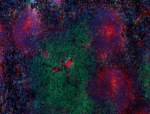
C57BL/6 frozen spleen section was fixed with 4% paraformalde... -
PE anti-mouse CD200 (OX2)

C57BL/6 mouse splenocytes were stained with anti-mouse CD45R... -
APC anti-mouse CD200 (OX2)
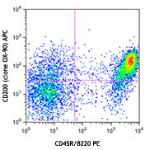
C57BL/6 mouse splenocytes were stained with CD45R/B220 PE an... 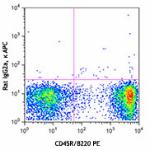
-
TotalSeq™-A0079 anti-mouse CD200 (OX2)
-
Alexa Fluor® 647 anti-mouse CD200 (OX2)

C57BL/6 mouse splenocytes were stained with CD19 Brilliant V... 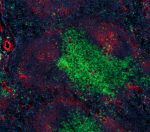
C57 frozen spleen section was fixed with 4% paraformaldehyde... -
Alexa Fluor® 594 anti-mouse CD200 (OX2)
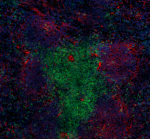
C57BL/6 frozen spleen section was fixed with 4% paraformalde... -
PE/Dazzle™ 594 anti-mouse CD200 (OX2)

C57BL/6 mouse splenocytes were stained with CD45R/B220 FITC ... -
PE/Cyanine7 anti-mouse CD200 (OX2)

C57BL/6 mouse splenocytes were stained with CD45R/B220 FITC ... -
TotalSeq™-B0079 anti-mouse CD200 (OX2)
-
TotalSeq™-C0079 anti-mouse CD200 (OX2)
-
Brilliant Violet 421™ anti-mouse CD200 (OX2)

C57BL/6 mouse splenocytes were stained with anti-mouse/human... -
Brilliant Violet 711™ anti-mouse CD200 (OX2)

C57BL/6 mouse splenocytes were stained with anti-mouse CD45...
 Login / Register
Login / Register 










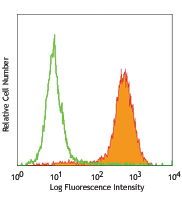
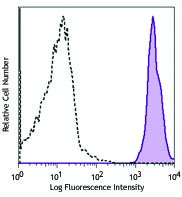
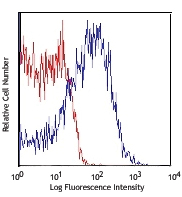




Follow Us